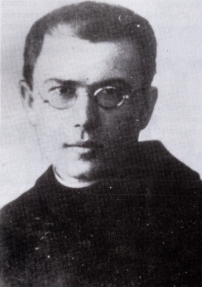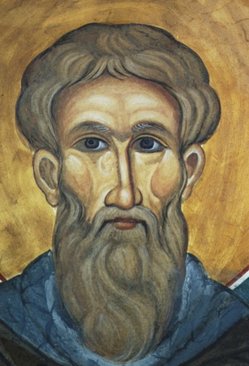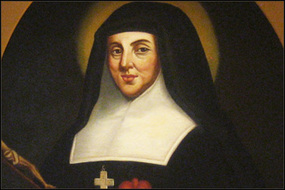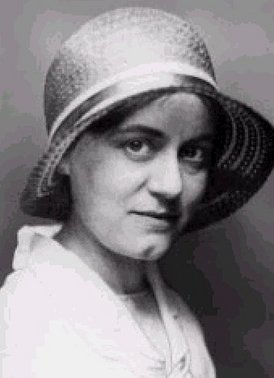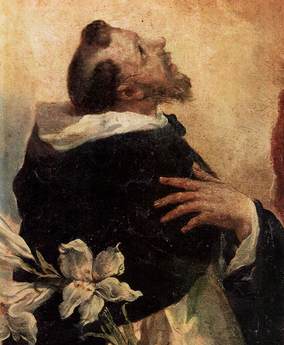The post from 2008 can be read here.
Saint Maximus the Confessor
The Byzantine Church celebrates the liturgical memorial of Saint Maximus the Confessor (ca. 580-662) today. He’s known for his defense of the orthodox faith against heretical teachings, particularly monothelitism (that Christ had only one will). His significant work in the study of Christ was his work on the Incarnation and the Trinity. Among the other theological interests was his respect for and obedience to the Church of Rome of whom Maximus said held true faith in the Trinity. His defense of the Roman Church set him against those who maintained that the Romans were heretics because they didn’t espouse Hellenism.
Champion of Orthodoxy, teacher of purity and of true
worship, Enlightener of the universe and adornment of hierarchs: All-wise
father Maximus, your teachings have gleamed with light upon all things. Intercede
before Christ God to save our souls. Troparion (Tone 8)
Let us the faithful
fittingly praise the lover of the Trinity, The great Maximus who taught the
God-inspired faith, That Christ is to be glorified in His two natures, wills,
and energies; And let us cry to him: “Rejoice, herald of the faith.” Kontakion
(Tone 8)
Saint Jane Frances de Chantal
I figured some wisdom from today’s saint is worth reading, even though it is not that extraordinary but its simplicity speaks volumes. Saint Jane Frances with Saint Francis de Sales founded the Order of the Visitation of Mary and so this letter of 1616 was written by her to one her spiritual daughters who must have been facing some criticism or some type of hassle from some in the monastery about her prayer life. Mother Jane Frances simply tells her correspondent not reveal all of the details of her prayer life not because she was advocating be obscure but there are times one ought to be discrete. What is a good reminder with Jane’s letter is the reminder that we all should pay close attention in keeping the Divine Presence in front of us. So often we are distracted by other things that we fail in keeping God prominently in front of our eyes. Msgr. Giussani reminds us of this necessity and Fr. Carrón hasn’t tired in reminding us of this daily witness to Christ.
The second point addressed in the letter provided below by Mother Jane Frances is her correspondent’s lack of confidence in her vocation. It could be that the young sister was feeling “dry in her prayer and her vocation,” having a lack of confidence that what she is doing is not as she expected. This real isn’t it? I can verify that many times I go in life without courage. This is also true was said of Blessed Mother Teresa who for 50 years experienced dryness in her prayer. But her faithfulness to time in prayer showed the depth of her love for Christ. From the opposite point of view, Jane uses Old Testament typology to illustrate how God has been faithful to His people not for one day but for all time. I believe that Divine Providence doesn’t give us anything in our life without the grace to “succeed” and everything we experience is given to us by God for our education. I find Saint Jane Frances de Chantal’s spiritual advice to be practical and human. Perhaps you might also.
Saint Jane Frances writes: “When you are asked what point of prayer you take, and the like, answer boldly as to what you have done or thought formerly in this way: “I have had such thoughts in prayer or done such things while walking about, or when in bed”; but do not say: “Today, or at such an hour, I have done such a thing.” It is not necessary to be so explicit, but simply say, “I have done or seen such a thing,” and have no scruple in calling all your good aspirations and thoughts prayer, for they are prayer, and so, for the matter of that, are all our actions when done to please God. It is enough to salute your good Angel morning and evening. Attention to the presence of God and of Our Lady includes all, for the blessed Spirits are engulphed in the abyss of the Divinity, and it is more perfect to walk simply. When a novice says to you, “What are you thinking of?” answer frankly, “I am thinking of God,” without saying (if it is not so), I was thinking of the Passion, and the like, for no doubt to mention a particular subject (if we were not thinking of it) would be an untruth. Say simply, “I was thinking of Our Lord,” and you might, for example, add, “My God, how happy we should be if we could always have the Holy Passion or the Nativity before our eyes.” This gives edification enough. I see nothing else to say.
Oh! but yes; just a word for my Little One. I beg of you, my dearest Sister, not to trouble about what you feel or do not feel, this I say once for all. Serve Our Lord as it pleases Him, and while He keeps you in the desert serve Him there with good courage. He made His dear Israelites spend forty years there, accomplishing a journey that they could have made in forty days. Take courage then, and be satisfied with saying, and being able to say, though without relish, “I wish to live wholly for God and never to offend Him”; and when you stumble, as is sure to happen (be it a hundred times a day), rise up again by an act of confidence. Do likewise towards your neighbor, be content with having the desire to love him, or desiring to desire it, and to procure for him all possible good, and, opportunity given, minister gently to him.
In short take bravely the road in which God leads you it is a safe one, although you may not have all the light and satisfaction you would like; but it is quite time to abandon to Our Lord all these plans and desires, and to walk blindly, as divine Providence wills, believing that it will lead you aright.
Saint Clare of Assisi
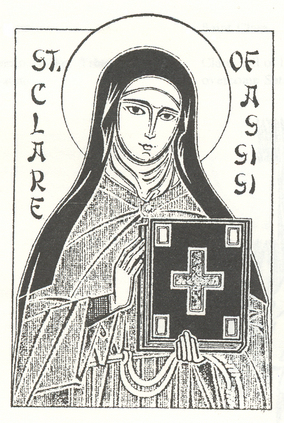 … for at the altar of the Blessed Virgin Mary, O Father, You mystically espoused Your Son to Your servant Clare, whom Blessed Francis had inspired with the desire of a higher life; You raised her to the summit of seraphic perfection, and chose her to become the mother of a family of virgins … (Franciscan Preface, feast of St Clare)
… for at the altar of the Blessed Virgin Mary, O Father, You mystically espoused Your Son to Your servant Clare, whom Blessed Francis had inspired with the desire of a higher life; You raised her to the summit of seraphic perfection, and chose her to become the mother of a family of virgins … (Franciscan Preface, feast of St Clare)O Light from Light, all splendor’s Source, Whose clear beams shine with heaven’s joy, We give you thanks for Mother Clare, And ev’ry form of praise employ.
Enticed by Francis’ preaching sweet, Christ Crucified became her spouse; She gathered sisters to her side Where poverty would grace their house.
She left behind all earthly gain
That riches true might be her all;
In poverty, obedience,
And chastity she heard Christ’s call.
As mother to her flock, she lived
And modeled Christ to ev’ryone;
In loving service spent herself
In toil from dawn to setting sun.
As she has shown us, Lord, your way,
So give us grace like her to be,
That we may turn from self to you
And in your way be truly free.
Most high, omnipotent, good God,
O Father, Son, and Spirit blest,
With Mother Clare and all your saints
Bring us, your Church, to endless rest.
J. Michael Thompson
Copyright © 2009, World Library Publications
LM; CREATOR ALME SIDERUM, BRESLAU, O WALY WALY
It is the Holy Spirit who gives us the sense that the Mystery of Christ is need
”The moment when we sense the mystery of God, or better, the mystery of Christ, as something pertinent to our own lives, as –in some way– for we cannot imagine the “how” of it-something useful and connected to life, is the gift of the Holy Spirit, it is grace.”
Saint Lawrence
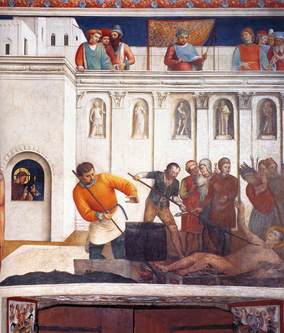 As blessed Lawrence lay on the gridiron, to which the
As blessed Lawrence lay on the gridiron, to which the
torturers held him fast with forks over the burning coals of fire, he cried out
to the wicked magistrate: “The roasting is done! turn now the carcass and
devour, for the rest of the substance of the church, which you desired, has
been garnered up into heaven by the hands of the poor! (an antiphon)
today the anniversary of the triumph of Saint Lawrence. For on this day he
trod the furious pagan world underfoot and flung aside its allurements, and so
gained victory over Satan’s attack on his faith. As you have often heard, Lawrence
was a deacon of the Church at Rome. There he ministered the sacred blood of
Christ; there for the sake of Christ’s Name he poured out his own blood. St.
John the Apostle was evidently teaching us about the mystery of the Lord’s
Supper when he wrote, “Just as Christ laid down His life for us, so we
ought to lay down our lives for the brethren.” Lawrence understood this,
and, understanding, he acted on it. Just as he had partaken of a gift of self
at the table of the Lord, so he prepared to offer such a gift. In his life,
Lawrence loved Christ; in his death, he followed n Christ’s footsteps.
Holiness is a disposition of the heart
Christian hope is not based on personal merit, nor
upon good works, nor good intentions, for all these are too transitory, and too
utterly disproportionate to the attainment of God; rather, our hope is based
upon God himself, upon Christ the one Mediator and Savior.
become rashness, it must obviously be accompanied by personal effort and
diligence; still we must be convinced that all our good will and good works are
always insufficient; only God can sanctify us, only God can raise us up to himself
and give us himself as our possession. Only God, the object of our hope, is
also the support of hope, its buttress, its fulcrum.
Therese of the Child Jesus wrote: Sanctity does not consist in this or that
practice; it consists in a disposition of the heart which make us humble and
little in the arms of God, conscious of our weakness, and confident to the
point of audacity in the goodness of our Father (Novissima Verba, pg. 29).
Intimacy
Saint Teresa Benedicta of the Cross (Edith Stein)
The liturgical prayer and some links for Saint Teresa Benedict is here…and a good biography is noted here.
14 Holy Helpers
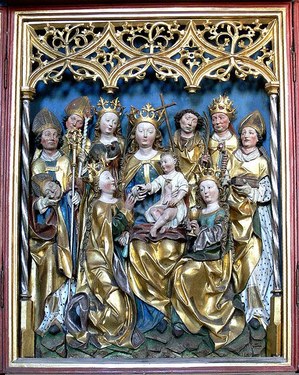 Almighty and merciful God, who didst adorn Thy Saints
Almighty and merciful God, who didst adorn Thy Saints
George, Blase, Erasmus, Pantaleon, Vitus, Christopher, Denis, Cyriacus, Acacius,
Eustace, Giles, Margaret, Barbara and Catherine with special privileges above
all others, so that all who in their necessities implore their help, according
to the grace of Thy promise, may attain the salutary effect of their pleading,
grant to us, we beseech Thee, forgiveness of our sins, and with their merits
interceding, deliver us from all adversities, and kindly hear our prayers.
Saint Dominic de Guzman
Blessed Cecilia’s description of Saint Dominic is how we know what he looked liked. And we have to be grateful for ancient chroniclers! They not only feed our curiosity but they show us concrete expressions of how God works through humanity … Descriptions like this one help us imagine what a person 8 centuries looked which helps to connect more closely to his reality. Blessed Cecilia wrote:
middle height and slender figure, of handsome and somewhat ruddy countenance,
his hair and beard of auburn, and with lustrous eyes. From out his forehead and
between his eye brows a radiant light shone forth, which drew everyone to
revere and love him. He was always joyous and cheerful, except when moved to
compassion at anyone’s sorrows. His hands were beautiful and tapering; his
voice was clear, noble, and musical; he was never bald, but kept his religious
tonsure entire, mingled here and there with a few grey hairs.” (From the
Legend of St. Dominic by Bl. Cecilia Cesarini)
